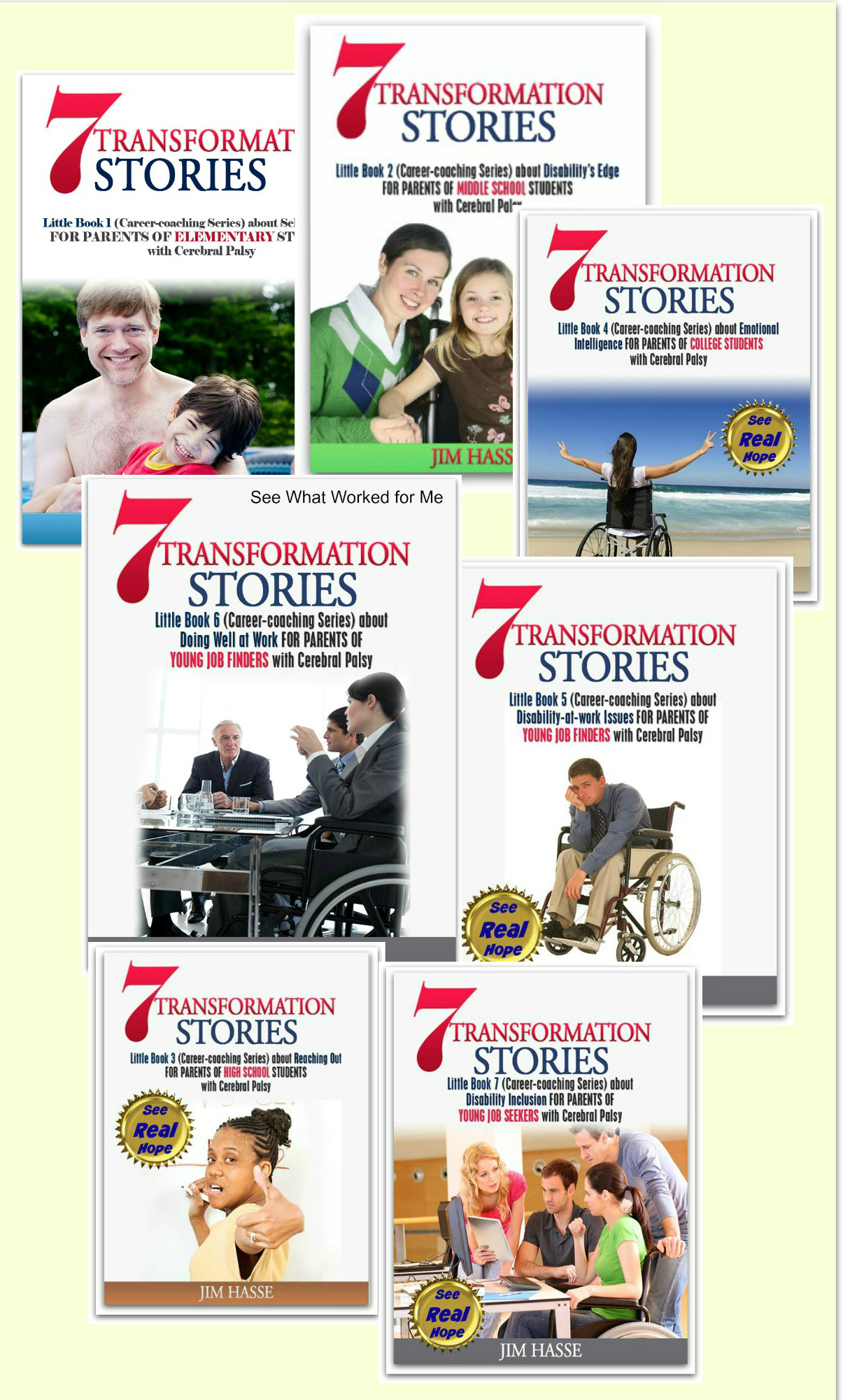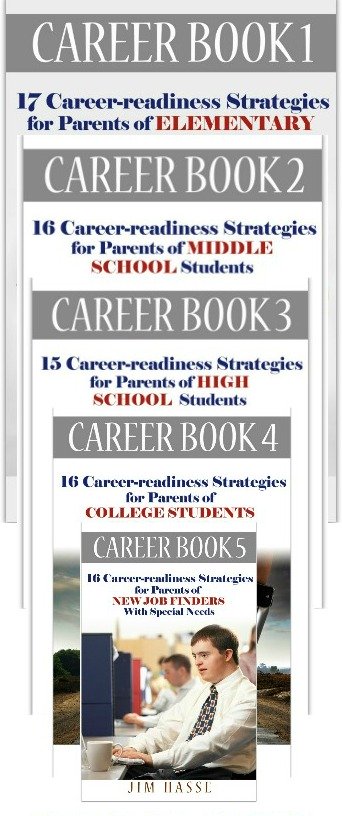Government Jobs: Cerebral Palsy Career Builder for College Student
By Jim Hasse, ABC, GCDF, Disability Employment Expert
_________________________________________________________
Consider government jobs. That’s a recommendation you may want to make as you mentor your college student with cerebral palsy (CP)
Here’s why I believe both federal and state government jobs, although they may not be as secure as they once were given the current economic and political climate, are still viable options for your youngster with CP:
Government agencies can be gateways into mainstream employment for people with disabilities because they are often in the forefront of leveling the recruitment playing field for people who are differently abled.
Federal and state government jobs are good employment options for your college student with CP because they offer a wide variety of exciting work environments, good wages, and medical benefits. And they offer applicants the opportunity to make a difference through public service.
Let’s first examine government jobs at the federal level. Here’s a quick fact sheet you can share with your college student:
 Government jobs can be gateways to a rewarding career.
Government jobs can be gateways to a rewarding career.Fact sheet about federal government jobs
Q: How do I become a federal employee?
A: There are three ways to get into the federal service.
- You can serve as an intern first – check www.wrp.gov.
- You can be hired competitively.
- You can be hired non-competitively (Schedule A).
Q: Where do I find out about federal government jobs?
A: Most federal vacancies are advertised on the USAJOBS website, where you can search for openings in a particular field, city, agency, or all three.
Note, however, that some agencies do not use USAJOBS to advertise vacancies, so always check specific agency websites for additional information on employment opportunities. A listing of agency sites can be found at www.usa.gov.
Q: What is Schedule A. Am I eligible to use it?
A: Schedule A is a non-competitive hiring authority available for federal agencies to hire and/or promote individuals with disabilities. By using Schedule A to fill a vacancy, an agency can avoid using the traditional, and sometime lengthy, competitive hiring process.
You are eligible for a Schedule A appointment if you are a person with a severe physical or mental disability.
Q: How do I prove my eligibility for Schedule A?
A: In order to receive a Schedule A appointment, you must:
- Be qualified for the job you are applying for – i.e., have the necessary knowledge, skills and abilities to perform the required duties.
- Demonstrate “proof of disability.”
- Be job ready.
Proof of disability can be satisfied with a simple letter stating that you have a severe disability. You can get this letter from your doctor, a licensed medical professional, a licensed rehabilitation professional, or any entity that issues or provides disability benefits.
The letter does NOT need to detail your medical history or your need for an accommodation. Simpler is better.
Individuals with a disability who opt to apply for a job through Schedule A -- a hiring authority allowing agencies to appoint a qualified, disabled applicant to a position without competing with the general public -- were previously required to produce a “certificate of readiness” from a medical professional or rehabilitation specialist, stating the individual could perform the job.
In February 2013, the Office of Personnel Management (OPM) removed this “certificate of readiness” requirement to be consistent with President Obama’s call to strip barriers to hiring people with disabilities into the federal workforce.
The OPM now states it is confident managers can use standard procedures when
interviewing you to ensure you are qualified for the
job.
What is
most attractive
about getting a job in state or federal government
for your soon-to-be job seeker with unexpected challenges?
Join PACER’s Facebook
discussion.
Q:
If I
find federal government jobs that I want to apply for and I want to use Schedule
A, what do I do?
A: Once you have your resume and references in order and have obtained your proof of disability, you are ready to apply.
The best first step, typically, is to contact the Disability Program Manager (DPM) or Selective Placement Coordinator (SPC) at the agency where you wish to work. You can find this person by either using the contact information included in the vacancy announcement itself (all announcements include a phone number or e-mail address to be used for questions) or by searching a directory of SPCs maintained by the Office of Personnel Management.
Please note the directory is not always up-to-date and not all agencies have a DPM or SPC, so you may need to speak with an HR professional within the agency instead.
Once you do, ask the DPM/SPC for guidance on the best way to proceed with applying for the identified vacancy. He or she can work with you to make sure your resume/application is considered. You may also apply online through the USAJOBS website or the specific agency’s website. Make sure you follow the application instructions as given in the job posting. When you fill out the application, indicate you wish to apply under Schedule A.
Q: Are agencies required to use Schedule A?
A: No. An agency can choose to use the traditional competitive process to fill its job vacancies; or they can choose to use the non-competitive Schedule A hiring authority.
Q:
If I am eligible for a Schedule A appointment, am I guaranteed a
job?
A: No.
By the way, also consider federal contractors. They're not covered by Section A, but on March 24, 2014, new rules for Section 503 of the Rehabilitation Act took effect, covering employers who are federal contractors or subcontractors.
The new rules require federal contractors and subcontractors to aspire to, and track progress toward, employing individuals with disabilities.
Called an aspirational goal, covered employers must now attain, or show progress toward attaining, a workforce that consists of at least seven percent of people with disabilities.
State Government Jobs
Most states also have level-playing field initiatives when it comes to recruiting and hiring individuals with disabilities, although they don’t offer the federal non-competitive Schedule A hiring authority, which is exceptional.
For information about what initiatives your
state offers in helping individuals with disabilities compete for government
jobs, go to www.disability.gov/employment#map
For example, in Wisconsin (where Pam and I live), job candidates with a disability who apply for a civil service position with Wisconsin State Government can participate in the Disabled Expanded Certification (DEC) program.
DEC is a special affirmative action program which gives persons with disabilities an increased opportunity to be interviewed for jobs in state government.
To be eligible for the DEC program, a candidate must have a permanent physical or mental impairment that substantially limits the major life activity of working. This means that the person’s disability significantly restricts his or her ability to perform a class or broad range of jobs when compared to the average person who has comparable training, skills and abilities.
Wisconsin also provides special accommodations to job seekers with disabilities to enable them to take civil service examinations. Those accommodations include readers, writers, large print exams, sign language interpreters, and other accommodations depending on the needs of the applicant.
In some cases, Wisconsin may even waive examinations for individuals with certain disabilities where one’s qualifications for the job cannot be adequately measured by a standard civil service exam.
I believe you’ll find similar provisions in the state where your college student with CP applies for state government jobs.
What is
most attractive
about getting a job in state or federal government
for your soon-to-be job seeker with unexpected challenges?
Join PACER’s Facebook
discussion.
Return from Government Jobs to Interview
Tips
Go to Cerebral Palsy Career Builders
This is Creative Commons content. You can freely and legally use, share and repurpose it for non-commercial purposes only, provided you attach this sentence and the following attribution to it (including the two links):
Originally written and illustrated by Jim Hasse, ABC, GCDF, owner of Hasse Communication Counseling, LLC, who, as a person with cerebral palsy, served for 10 years as a vice president in a Fortune 500 company during his 29-year career in corporate communication. He’s an Accredited Business Communicator, certified as a Global Career Development Facilitator and author of 14 Amazon books about disability awareness and disability employment issues.





